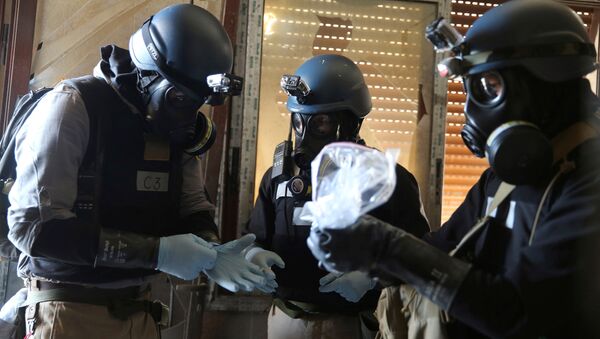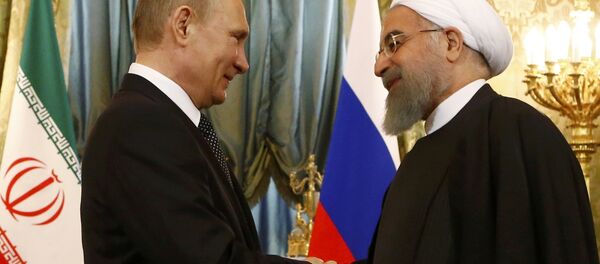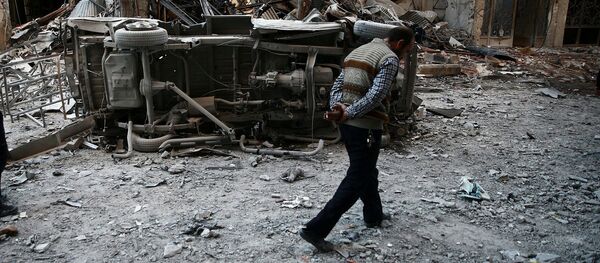Last week, Washington pulled what seemed like a 180 degree turn on its Syria policy, launching 59 Tomahawk cruise missiles at Syria's Ash Sha'irat airbase in Homs province, destroying six MiG-23 fighters, killing over a dozen soldiers and civilians, and causing significant damage to the base.
However, on Tuesday, everything changed. A chemical attack in the town of Khan Shaykhun in rebel-held Idlib province took the lives of over 70 people, injuring hundreds of others. The Pentagon rushed to pin the blame on the Syrian government, providing no evidence, apart from some internet videos featuring the White Helmets, who are known by detractors as 'al-Qaeda's civil defense' for their close ties to jihadist militants. Damascus insisted that it "did not, does not and will not" use chemical weapons, even against suspected terrorists.
Other theories soon emerged, featuring actual timelines and important background information. The Russian Defense Ministry reported that Syrian aircraft did indeed conduct an airstrike on a warehouse containing ammunition and equipment belonging to terrorists near Khan Shaykhun, and suggested that the warehouse may have contained a rebel chemical arms stockpile. However, on Thursday, Syrian Foreign Minister Walid Muallem explained that the first reports of the chemical attack appeared several hours before the government airstrike, indicating that the chemical attack may have been a cruel and cynical 'false flag' operation used by the jihadists in a bid for US support. Russia has since submitted a draft resolution to the UN Security Council to further investigate the incident.
However, instead of waiting for the results of any inquiry, the Trump administration launched airstrikes at the Sha'irat airbase, leading observers to speculate that the Khan Shaykhun chemical attack was just a pretext for Thursday night's show of deadly force.
Commenting on the week's events, Diego Pautasso, international affairs expert and professor of political scientist at Brazil's Vale dos Sinos University, recalled that US policy appears to be realigning with Obama-era strategy going back to the early part of the decade.
"What we are seeing is a continuation of what began following the Arab Spring, when Western powers decided to support the rebels, with the intention of overthrowing the government of Bashar Assad," the analyst told Sputnik Brazil. "Since then, all the maneuvers by the US and its allies in Europe and the Middle East have been undertaken toward achieving this goal."
Unfortunately, last week's events were "not the first time that they have used chemical weapons as a pretext," Pautasso added. "The same thing happened in 2013" (in Ghouta). Then too, the professor recalled, the Syrian government's guilt was never proven, and then too the claims almost led to a massive US-led attack against the country.
Fortunately, "back then, the US participated with Russia in demobilizing Assad's chemical weapons arsenal." Now however, "they are returning to this argument," the expert noted.
"It's noteworthy that the same pretext was used by the US in 2003 to invade Iraq," he added.
Many other observers have taken note of the similarities between the Syrian accusations and the US pretext for invading Iraq in 2003. On Friday, Bolivian Permanent Representative to the UN Sacha Sergio recalled former US Secretary of State Colin Powell's claims that the US had 'convincing proof' that Iraq was developing weapons of mass destruction, holding up the famous image of Powell holding a mock vial of chemical weapons before the international body.
Going back further in history, Pautasso suggested that US authorities have made it a habit to use false pretexts to justify aggression, and that this policy goes back well over a hundred years. "This is not the first time that the US is using such 'dirty tricks'…i.e. the creation of 'facts' to legitimize intervention. The most famous examples in history are Cuba in 1898, and in the 20th century, the excuse that the US needed to join the Vietnam War."
Ultimately, former Syrian Information Minister Mahdi Dakhlalla told Sputnik that Tuesday's gas attack, and Thursday's airstrikes were both aimed at interrupting the recent chain of victories by the Syrian Army. However, he stressed that the attack would have an effect that's the opposite of what was intended, only further strengthening Syrian-Russian ties. The expert noted that the US aggression will be sure to fail, because the circumstances are unfolding in favor of Damascus and Moscow.





